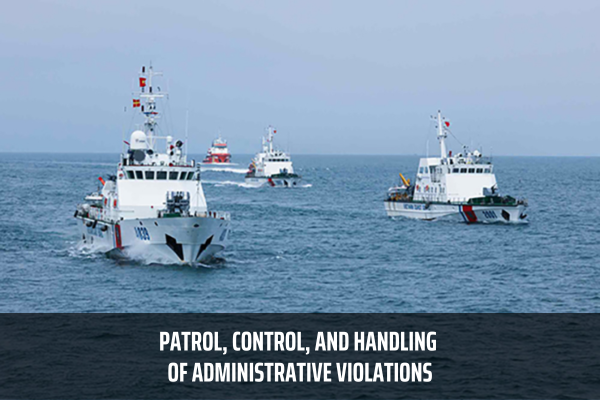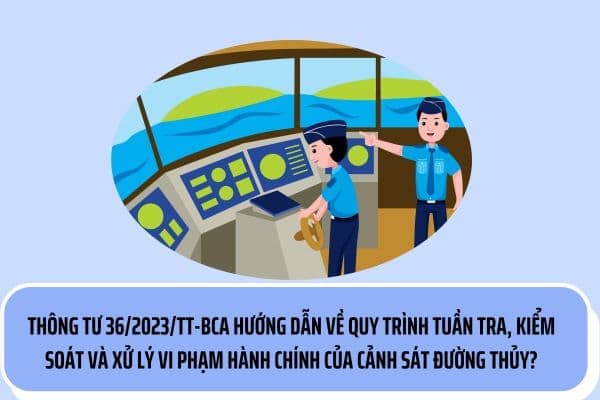What is the Circular 36/2023/TT-BCA on patrol, control, and handling of administrative violations by the Vietnam's Waterway Police?
- What is the Circular 36/2023/TT-BCA on patrol, control, and handling of administrative violations by the Vietnam's Waterway Police?
- When will Vietnamese officers performing patrol and control duties according to the plan can stop vehicles for inspection?
- What are the requirements of Vietnamese officers performing patrol, control, and handling of administrative violations on waterways?
What is the Circular 36/2023/TT-BCA on patrol, control, and handling of administrative violations by the Vietnam's Waterway Police?
On August 2, 2023, the Ministry of Public Security issued Circular 36/2023/TT-BCA, which regulates the patrol, control, and handling of administrative violations by the Waterway Police.
Circular 36/2023/TT-BCA specifies the procedures for developing and implementing patrol and control plans, conducting patrols, controls, and handling of administrative violations on inland waterways, foreign waters within the flow, unmanaged and unexploited water areas under inland water transport, port areas, and maritime routes where inland watercraft are permitted to operate (hereinafter referred to as waterways) and handling of administrative violation cases at the unit's headquarters.
Circular 36/2023/TT-BCA applies to the following entities:
- Waterway Police officers (hereinafter referred to as officers) responsible for patrol, control, and handling of administrative violations on waterways.
- Police units and local authorities.
- Relevant agencies, organizations, and individuals involved in the patrol, control, and handling of administrative violations on waterways.

What is the Circular 36/2023/TT-BCA on patrol, control, and handling of administrative violations by the Vietnam's Waterway Police?
When will Vietnamese officers performing patrol and control duties according to the plan can stop vehicles for inspection?
Pursuant to the regulations in Article 8 of Circular 36/2023/TT-BCA, officers performing patrol and control duties according to the plan can stop vehicles for inspection in the following four cases:
- Directly detecting or using technical equipment to identify signs of law violations.
- Implementing the instructions, patrol and control plans, and work plans approved by the Chief of Waterway Police, Traffic Police Director, and District Police Chief.
- Having a written request from the Chief or Deputy Chief of the investigating agency, or relevant authorities, to control vehicles for the purpose of national security protection, social order, and safety.
- Receiving reports or accusations of law violations related to individuals and vehicles participating in traffic.
The vehicle inspection must meet the following requirements:
- Ensuring safety and compliance with legal regulations without obstructing traffic. Once the vehicle is stopped, the inspection and handling of violations (if any) must be carried out according to legal regulations.
- Choosing a control location with a wide, open view and no obstruction to ensure that stopping and inspection are conducted publicly and transparently.
- In the case of stopping and inspecting vehicles carrying flammable, explosive, hazardous, or other dangerous goods, in addition to meeting the requirements in points a and b of this clause, measures must be taken to ensure the safe guidance of vehicles away from residential areas or deserted areas before conducting the inspection.
Vehicle stopping signal:
- When stopping a vehicle for inspection, it should be based on the traffic density, flow situation, and characteristics of the route to ensure the safety and normal flow of other vehicles. The following signals should be used:
+ During the day, raise the "K-shaped flag" towards the vehicle to be inspected, wave it three times vertically from top to bottom, and simultaneously sound a long tone, a short tone, and a long tone.
+ At night, direct the signal lights towards the vehicle to be inspected, emit one long flash, one short flash, and one long flash, and simultaneously sound a long tone, a short tone, and a long tone.
+ In addition to the above signals, a loudspeaker can be used to instruct the vehicle to stop or slow down for inspection.
What are the requirements of Vietnamese officers performing patrol, control, and handling of administrative violations on waterways?
Pursuant to the regulations in Article 3 of Circular 36/2023/TT-BCA, officers performing patrol, control, and handling of administrative violations on waterways must meet the following requirements:
- Adhere to the provisions of the law on inland waterway and maritime traffic (hereinafter referred to as waterway traffic), administrative violation handling laws, Circular 36/2023/TT-BCA, and other relevant legal regulations.
- Fulfill their assigned tasks in accordance with the provisions of the law and the approved patrol and control plans, taking responsibility for their duties. Practice democracy in ensuring order, traffic safety, and the People's Police Order.
- Maintain a proper attitude and behave appropriately when interacting with the public and individuals who have violated the law.
- Detect, prevent, and promptly handle violations of waterway traffic laws and other related laws in accordance with the appropriate authority, procedures, and regulations.
- Ensure compliance with other requirements and regulations of the Ministry of Public Security.
Note: Circular 36/2023/TT-BCA will come into effect on September 16, 2023.
LawNet

